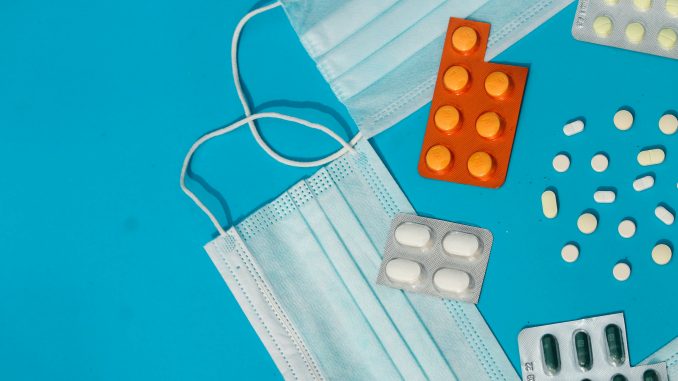
A large-scale clinical trial at Canada’s McMaster University has offered some encouraging news in the fight against Covid-19. After testing several treatments on thousands of patients over the past six months, one drug has stood out to researchers: the commonly prescribed antidepressant fluvoxamine.
According to the TOGETHER study, patients given fluvoxamine within a few days of testing positive for the novel coronavirus were 31 percent less likely to be hospitalized, and similarly less likely to be put on a ventilator—a significantly larger impact on outpatient wellbeing than most other potential Covid-19 treatments.
“This is a huge finding,” celebrated study co-author Ed Mills, a professor of health sciences at McMaster University, “the game changers are things we already had in the cupboards.”
Indeed, what makes these findings particularly significant is the fact that fluvoxamine is inexpensive to produce as a generic drug: in the US, fluvoxamine costs just $4 to produce, while a course of monoclonal antibodies for the treatment of Covid-19 costs upwards of $2,100. For poorer countries battling low vaccination rates and minimal access to more advanced Covid-19 treatments, this little pill could spell the difference between hundreds or thousands of deaths.
At the same time, fluvoxamine has already received approval from the US Food and Drug Administration (FDA) for use in treating obsessive-compulsive disorder (OCD). In practice, this means any doctor can prescribe the drug for use against Covid-19 using their clinical judgement. Monoclonal antibodies, meanwhile, remain an investigational therapy, and need to be administered intravenously by a doctor.
The news of the discovery comes at a pertinent time for public health officials: epidemiologists have long predicted that even high vaccination rates will not eradicate Covid-19, but that the disease will become endemic like so many others. While the development of antibody therapies and other new treatments are no doubt exciting evolutions in modern medicine, financial and logistical considerations mean they will only be available to a tiny subset of Covid-19 patients. Uncovering “cupboard game changers” like fluvoxamine will prove essential if we are ever to usher in the next stage of this interminable Covid-19 pandemic.
Indeed, this kind of drug—already approved by medical regulators for use against other diseases and proven safe and well-tolerated—represents a largely untapped gold mine of coronavirus treatments. Encouragingly, there are several of these on the cards already.
California-based firm Rigel Pharmaceuticals, for example, has seen positive results in clinical trials evaluating whether its drug fostamatinib, marketed in the US as Tavalisse and in Europe as Tavlesse, could help hospitalized Covid patients.
At present, fostamatinib is an FDA-approved treatment for chronic immune thrombocytopenia (ITP), a blood disorder in which the body’s own immune system destroys blood platelets needed for blood clotting and healing. Patients battling ITP live with an increased risk of serious bleeding events, medical complications and even death—something which fostamatinib, an oral spleen tyrosine kinase (SYK) inhibitor, helps alleviate.
It now seems that the drug may also benefit coronavirus patients. Phase II trials conducted in partnership with the National Institutes of Health (NIH) tested fostamatinib as a potential therapy for hospitalized Covid patients requiring supplemental oxygen. Results from the Phase II trial were recently published in the Clinical Infectious Diseases journal, an official publication of the Infectious Diseases Society of America.
The trial demonstrated that fostamatinib was safe and well-tolerated by the patients, and that the medicine helped reduce the inflammatory complications of Covid. Encouragingly, fostamatinib was found to expedite patient recovery, with patients treated with fostamatinib showing a clinically significant improvement over patients treated with standard of care therapies alone. Among the study participants, fostamatinib appeared to not only halve the chance of severe adverse events but also reduced the number of days that Covid patients spent in the Intensive Care Unit (ICU) by more than half. It also significantly reduced the number of days which patients spent on oxygen; by day 15, 65.5% of patients in the fostamatinib group no longer required supplemental oxygen, compared to 39.9% in the placebo group.
Rigel is now carrying out Phase III trials of Tavalisse, supported by a $16.5 million grant by the US Department of Defense, and fostamatinib is also being evaluated as part of the ACTIV-4 Phase III trials organized by the National Heart, Lung and Blood Institute (NHLBI).
Other potential candidates may soon see the light, too. A recent study by the University of Michigan found that a number of already-approved drugs on the market, including one dietary supplement, showed success in blocking or reducing the Covid-19 infection in cells.
The groundbreaking study used artificial intelligence to analyze human cells infected with Covid-19. More than 1,400 individual FDA-approved drugs or compounds were then used to treat the cells, resulting in 17 potential candidates. Of those, ten treatments were newly recognized- including lactoferrin, a protein found in human breast milk that is available over the counter as a dietary supplement.
According to the study’s authors, the next step could be clinical trials for some of the candidates identified. “Traditionally, the drug development process takes a decade—and we just don’t have a decade,” urged Jonathan Sexton, Ph.D., assistant professor of Internal Medicine at the U-M Medical School. “The therapies we discovered are well positioned for phase 2 clinical trials because their safety has already been established.”
Amid surging case numbers across the world as the Delta variant takes hold—and the specter of new variants of even greater concern—the prospect that easily-available drugs, already approved for other diseases, could prove effective treatments for the coronavirus offers a ray of hope for patients and health workers alike. A more manageable chapter of the Covid-19 pandemic may be closer than we realize.


Leave a Reply